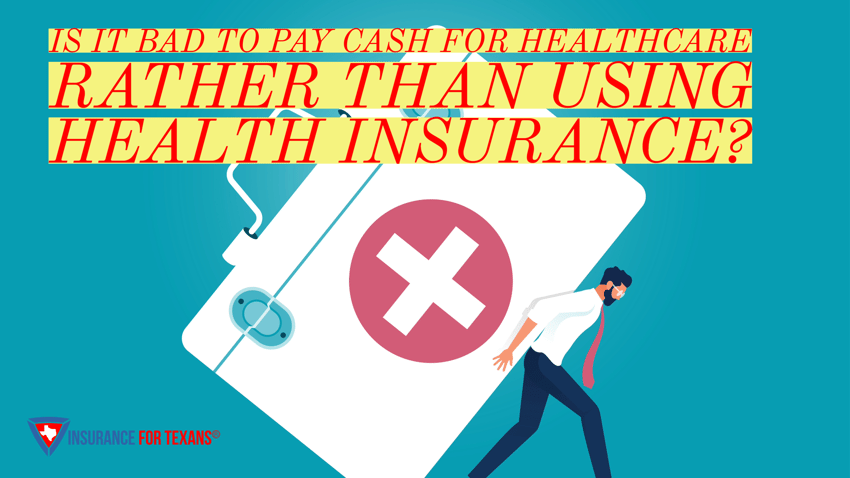As we gear up for the end of the year and navigate open enrollment season health insurance, the team at Insurance for Texans believes it's high time to revisit the way we approach health insurance and paying for medical expenses. Let's dive into a topic that's been causing some buzz lately: paying cash for health care. Is it a bad idea? Well, we're here to tell you that it's not as straightforward as it seems.
When it comes to health insurance, many of us are in the process of making health plan selections for the upcoming year. This is the time when employers conduct open enrollment, and individuals who purchase health insurance through the Affordable Care Act Exchange also need to make their choices. One burning question we often encounter at Insurance for Texans is whether paying cash for a doctor's visit or an urgent care appointment contributes to meeting one's health insurance deductible.
However, we're here to shift the focus from fixating solely on meeting the deductible. There's a broader perspective to consider, and today, we'll explore why paying cash for health care services might not be such a big deal after all.
Health Insurance Basics
Before we talk specifically about whether or not paying cash for medical care is good or bad, let's start with some basics. If your health insurance plan falls under the Preferred Provider Organization (PPO) category, you likely have the option for out-of-network benefits. This means that if you choose to pay for a health care service in cash and it's considered out-of-network, you can file paperwork to have that payment applied to your deductible and maximum out-of-pocket expenses for the year. This approach can work well for PPOs, which are common in many employer-based or work-based health insurance plans.
However, there's a twist for those on either a Health Maintenance Organization (HMO) or Exclusive Provider Organization (EPO) plans. These plans typically don't offer out-of-network benefits for medical services, unless the situation is an emergency. So, if you find yourself at an urgent care facility on a Friday night, battling the flu, and you pay for the visit in cash, it won't count toward your deductible if it's outside your network. But fear not, because this doesn't have to be a disaster for you so long as your medical bills are not extraordinary.
Rethinking Cash Payments For Medical Costs
Let's take a step back and reevaluate our perspective on health care costs and how health insurance plays a role in them. Have you heard of a high deductible health plan? It's a game-changer that can be applicable to various health plan types, whether PPO, HMO, or EPO. This type of plan operates differently from what many Texans have grown used to. Instead of aiming for the lowest deductible and minimal copayments for regular doctor visits, a high deductible health plan takes a unique approach where you pay a cash price for office visits, laboratory tests, or other costs of care prior to the deductible being met on your health insurance plan.
Many individuals gravitate towards plans with lower deductibles and copays as they provide a sense of immediate financial relief. It also doesn't hurt that the pretty marketing from the insurance company makes it appear that they are handling everything. However, these plans often come with significantly higher monthly premiums which is costing you more out of pocket in medical spending unless you have a major health event. This is where a High-Deductible Health Plan (HDHP) comes into play. By opting for a qualified HDHP, you have the opportunity to couple it with a Health Savings Account (HSA), which can lead to substantial reductions in your monthly premiums—sometimes even saving you hundreds of dollars each month. The trick is that you will be paying that cash price for the cost of health care until that deductible is met.

What's The Catch With Paying Cash For Healthcare Costs?
Now, let's address the elephant in the room—paying cash for health care services. With a high deductible health plan, this becomes a part of your new strategy. You will be paying out of pocket 100% for covered expenses until the deductible is met. Those monthly savings in the premiums can be put towards the cost of those visits with your medical providers. As long as you are in network, these payments will also count towards your out of pocket maximum for the year as well.
But what about medical bills or other out of pocket costs that are not deemed "in-network" with your HDHP? While these cash payments might not count towards your deductible, the financial advantages of the lower monthly premiums can easily outweigh the occasional out-of-network cash expenses.
For instance, let's say you have a specialist you visit once or twice a year, and each visit costs you around $200. While these payments might not directly contribute to your deductible, the amount you save in reduced premiums throughout the year can far outweigh these sporadic costs. Think about it: paying $200 a couple of times per year versus saving hundreds of dollars month after month. We may not have a fancy math degree, but we are very sure that the math on that trade works out in your favor! That seems pretty Texan to us!
One Final Consideration For Your Medical Bills
But wait! There's more! High deductible health plans have another trick up their sleeve—lowering your maximum out-of-pocket expenses in the event of a major health issue. If you end up needing hospitalization or facing substantial hospital bills, having a high deductible plan can offer you financial protection by capping your potential medical bills. The out of pocket maximums on HDHP have typically been lower than other major medical plans that the health insurance companies are offering to Texans in the open marketplace. This means that you not only save money up front on monthly premiums, you actually reduce your total dollars at risk for your total medical bills. That's a classic win-win scenario.
Rethinking Health Spending
It's time to rethink the way we evaluate health insurance and health care expenses. Rather than fixating on copayments and immediate annual deductible satisfaction, let's focus on the bigger picture—the total dollars you're spending on premiums, regular visits, and potential major events. At Insurance for Texans, we're all about custom solutions tailored to your unique situation. We take into account your specific needs, including prescriptions, specialists, and preferred doctors, to help you make an informed decision about your health care coverage. That may mean paying cash to see a specific health care provider and using health insurance for other financial concerns.
The takeaway here is that paying cash for health care services isn't necessarily a negative thing. It's a strategic move that, when combined with a high deductible health plan, can lead to substantial savings over time. The key is to approach health insurance from a holistic perspective, weighing the costs and benefits of premiums, routine expenses, and the risk of potential major events.
At Insurance for Texans, our goal is to empower you to navigate the world of health insurance with confidence. We're not aligned with big insurance companies; we work for you. So if you're ready to take control of your health care dollars and explore the advantages of high deductible health plans, give us a call at (469) 789-0220 or visit our click that button below. Let's tackle the health care dollar problem together and ensure a healthier financial future for all Texans.


